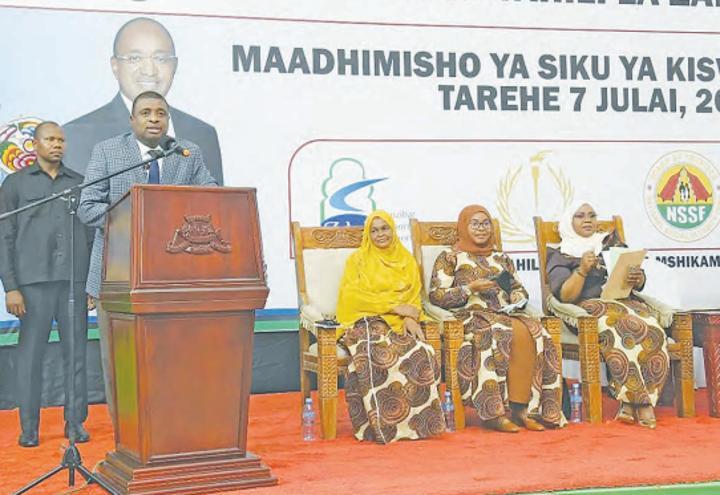Africa-Press – Tanzania. ZANZIBAR hosted this year’s official World Kiswahili Language Day celebrations on July 7, with growing momentum across Tanzania to reaffirm the country’s commitment to the promotion, preservation, and global expansion of Kiswahili, the most widely spoken African language.
In a powerful symbolic moment earlier this this month, President Samia Suluhu Hassan, while addressing the 50th independence anniversary of the Comoros, urged leaders across Africa to embrace Kiswahili as the continent’s unifying language.
She pledged Tanzania’s support through the provision of Kiswahili teachers, stressing that Kiswahili alone holds the potential to connect African nations linguistically, culturally, and economically.
Yet, even as President Samia champions Kiswahili on international platforms, leaders within Tanzania caution that more must be done domestically to seize the many opportunities the language offers, particularly in education, media, and creative industries.
Speaking on behalf of the President of Zanzibar at the Kiswahili Day event, Second Vice » President Hemed Suleiman Abdulla reiterated the government’s unwavering commitment to the language.
“Tanzania will continue to invest in strengthening Kiswahili through its national councils, BAKIZA and BAKITA, its education system, and the media,” he said. “This language, born in Africa, carries untapped social and economic potential.”
Hemed emphasized that the official recognition of Kiswahili by UNESCO in 2021, which designated July 7 as World Kiswahili Language Day, has elevated the language’s global stature. He noted that Kiswahili continues to spread across Africa, Asia, Europe, and the Americas, where it is increasingly used in economic, diplomatic, and academic contexts.
He urged institutions, both public and private, to comply with national language policies and promote the correct and eloquent use of Kiswahili. “This is vital to maintain its authenticity and global appeal,” he added.
Hemed also praised BAKIZA and BAKITA for their tireless efforts in coordinating the development of the language and expanding its reach both within Tanzania and internationally.
Professor Palamagamba Kabudi, Minister of Information, Culture, Arts and Sports in government of the united republic of Tanzania, called Kiswahili a defining symbol of African identity. He commended Zanzibar President Dr Mwinyi for his proactive role in elevating the language’s status through policy, education, and advocacy.
Echoing this sentiment, Dr Saade Said Mbarouk, Chairperson of the Zanzibar Kiswahili Council (BAKIZA), said Kiswahili Day is a moment to reflect on the strides made in promoting the language. “Our two governments have shown exceptional commitment,” she said, “and the councils will continue to support all efforts to elevate Kiswahili on the global stage.”
Representing UNESCO, Ms Nancy Mwaisaka confirmed continued support for Tanzania’s leadership in language promotion. She noted that Kiswahili has become an instrument of empowerment, especially for women and youth, by promoting social inclusion and economic participation.
“Kiswahili is now a global tool for diplomacy, education, and culture,” Nancy said. “UNESCO will ensure it remains a vital force in strengthening peace and unity across Africa and the world.”
This year’s Kiswahili Day featured grand fashion in Zanzibar, where a week-long series of cultural, academic, and public engagement activities culminated in the official celebration at the Ziwani Police Hall.
Ms Fatma Hamad Rajab, Permanent Secretary at the Ministry of Information, Youth, Culture and Sports, said academic forums, youth engagement sessions, exhibitions, and a special women’s leadership dialogue were among the activities to celebrate the International Day.
A forum titled “Mwanamke Hazina” (A Woman is a Treasure) at New Amani Hotel, where Ms tabia Maulid Mwita- Zanzibar Minister of Information, on behalf First Lady Mariam Mwinyi graced the session on women, literature, and governance, was among the events.
The theme running through the celebrations, “Swahili: The Pride of Africa”—was also the focus of events launched in late June in Arusha, including a community marathon attracting regional and international participation.
As Kiswahili gains international recognition, now taught in universities around the world and broadcast in international media, Tanzania’s leadership remains pivotal. The World Kiswahili Day celebrations in Zanzibar are not just a cultural occasion; they represent a renewed call for Tanzanians to lead the global renaissance of their language.
From the grassroots to global forums, the message is clear: Kiswahili is not only a national treasure but a continental asset—one that carries the voice, dignity and dreams of Africa to the world.
For More News And Analysis About Tanzania Follow Africa-Press







